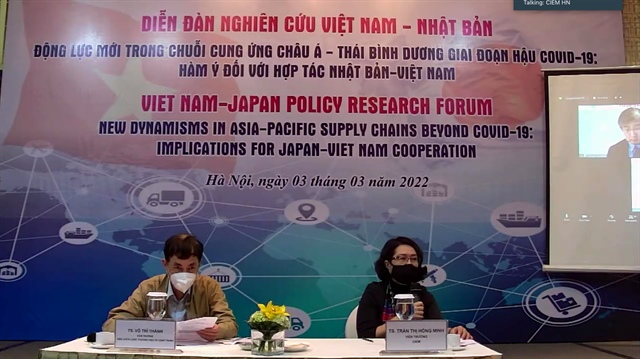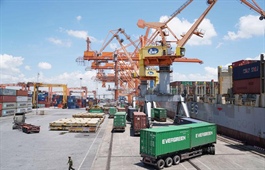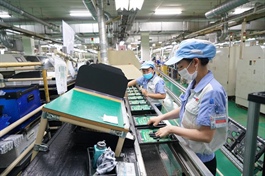Bolstering Japan-Vietnam cooperation in regional supply chain: experts
Bolstering Japan-Vietnam cooperation in regional supply chain: experts
Vietnam and Japan share similar strategic objectives, for which the two can complement each other in terms of development level, technological capabilities, trade, and population structures.
Bolstering the cooperation among the countries in the Asia-Pacific, including Vietnam and Japan, has become significant to maintain regional and global supply chains in a fast-changing world.

Director of the Institute of Branding and Competition Strategy Vo Tri Thanh and Director of the Central Institute for Economic Management (CIEM) Nguyen Thi Hong Minh co-chair the conference. Photo: Nguyen Tung |
Experts shared the view during a conference held today [March 3] to discuss the new dynamism in Asia-Pacific supply chains beyond Covid-19.
According to the Director of the Central Institute for Economic Management (CIEM) Nguyen Thi Hong Minh, the Asia-Pacific has been going through changes in regional order with the highlights being the emergence of China and the strategic competition between China and the US.
“There have been efforts to seek strategic alliances, along with growing risks in terms of economic isolationism, trade or technologies detachment among superpowers,” Minh said.
Meanwhile, the irreversible trend of Industry 4.0 and digital economy has become key issues in discussion for international cooperation, she added, noting the context has led to fundamental changes in economic integration and the development of supply chains in ASEAN.
The pandemic, in this context, has added more complexity to the issue by disrupting the supply chains, not to mention restriction measures in each country.
“Business operations are facing severe consequences from the lack of input materials and rising logistics costs,” Minh said.
It’s imperative for countries to strengthen the resilience of the supply chains by keeping close cooperation among countries. “A comprehensive strategic partnership in place is the foundation for Vietnam and Japan to bolster the relations,” she suggested.
Sharing the view, the Director of the Institute of Branding and Competition Strategy Vo Tri Thanh considered the Vietnam-Japan cooperation to have huge potential.
“Both share the same values and culture, and are also members of multilateral economic-finance agreements in the region and globally, such as the WTO, CPTPP, or RCEP as the latest,” Thanh said.
More importantly, Thanh pointed out a similar view in strategic objectives of Vietnam and Japan, for which the two can complement each other in terms of development level, technological capabilities, trade, and population structures.
As of late 2021, Japan remained the second-largest investor out of 141 countries and territories having investment projects in Vietnam for total FDI commitments of $63.94 billion, 65% of which are concentrated in manufacturing and processing.
Despite all the positivity, the Head of CIEM’s General Research Department Nguyen Anh Duong pointed out that Vietnamese firms’ participation in supply chains led by Japanese counterparts is still limited and improves slowly.
For greater efficiency in cooperation between businesses from Vietnam and Japan, Duong called for the Government to continue ensuring effective Covid-19 containment and the sufficient supply of labor force.
“There should be concrete reforms toward a safe, enabling, and competitive business environment,” he said while urging local businesses to take better advantage of free trade agreements that Vietnam and Japan are members of, such as the CPTPP or RCEP, to strengthen linkages with Japanese companies.
“This is particularly important as Japanese companies are looking to diversify their supply chains, and trade deals in place between the two countries is an advantage for Vietnam,” he concluded.

























